Divine Providence, Kettlebells and the Lee Bacchi story
By Adrienne Harvey, SrPCC, RKC-II, CK-FMS
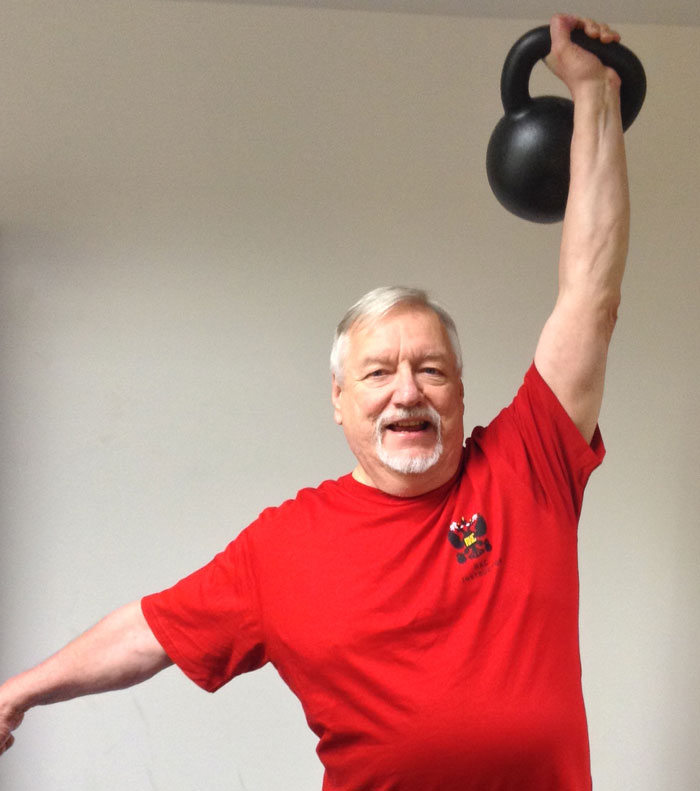
Dragon Door: How did you get into kettlebells?
Lee Bacchi: I had been doing traditional barbell and dumbbell exercises since 1977. A little over three years ago I just got really tired of it. At the gym where I work out, it just so happened that I saw a man doing a get-up with a kettlebell. I had heard about
kettlebells, but had never worked with them. It looked like something I would like to do. So, after he finished his get-up I went over and talked to him a little bit. He told me that he was taking private kettlebell instruction, so I figured I probably needed to find an instructor to get started. I googled instructors in my area and found a fantastic trainer, Pete Moore, in late March, 2014. After a couple of months I realized that kettlebell training was what I had been looking for!
Dragon Door: What do you like the most about it?
Lee Bacchi: Number one, it’s unusual, and I've always been drawn to the unusual. It’s rare to see many people in big box gyms using kettlebells—or using kettlebells correctly. When I saw the get-up I thought it looked like a really good way to move to keep myself healthy, flexible, and moving correctly. When I first started working with Pete I didn’t know how involved I wanted to get with kettlebells, but after about 2-3 months I was hooked!
I started looking at the HKC, and saw that one was coming up in Chicago in February of 2015—less than a year away at the time. After I passed the
HKC at 64 years old, Pete asked if I wanted to go any further. He told me about the RKC, and I decided to think about it but wanted to go ahead and start working towards it to see what would happen. Next, I learned the clean, military press, and the snatch. Pete said that it would probably take me two years to get ready for the RKC. This gave me a goal to work towards. Sure enough, in May of this year—two years and three months after my HKC—I earned my
RKC.
Dragon Door: That’s very recently! Congratulations!
Lee Bacchi: It’s been less than a month. I'm 66 years old which means I am living proof that you
can teach an old dog new tricks! This has been one of the most exciting things, since I have also been discovering other new ways to train for fitness and health along with kettlebells. Recently, I took a two hour mace workshop in Chicago, I did Original Strength, and other outside-the-box ways to build a
strong foundation for health and fitness. I will probably never go back to just doing regular barbell exercises other than deadlifts to help build overall strength.
Kettlebells have opened a whole new perspective. Before I only trained bench press, back squat, and dumbbell exercises, but now I do get-ups, snatches, one arm swings, alternating swings, and other exercises I never knew about before. It was all just waiting for me.
Pete and I joked that it was Divine Providence that I found him, and while we laughed about it, I don't think it was really a joke, it was meant to happen! While working with kettlebells has not been easy for me, it requires a lot of humility and patience. I am just so glad I found them.
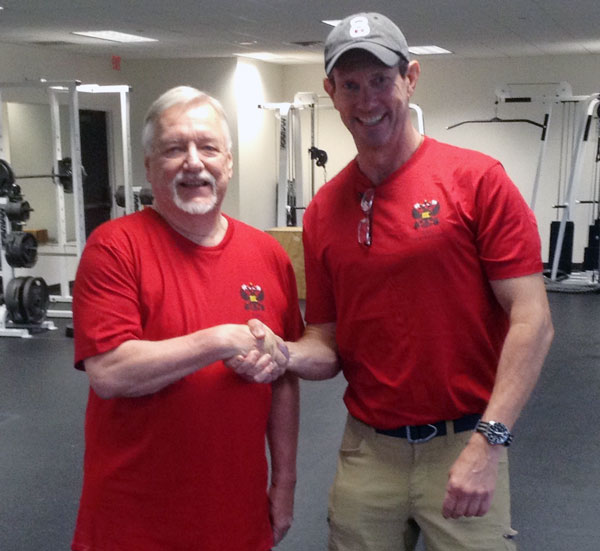
Dragon Door: I think part of the lesson with kettlebells, especially at first is having the humility to take on a big learning curve.
Lee Bacchi: I thought that I'd go in and have it all down within 3-4 sessions, but no way! It requires a good instructor like Pete, and the humility to start relearning some stuff. That’s an important part of life, period. We always need to start, and this training worked in really well.
When I got my HKC, I was just absolutely thrilled. Pete suggested that I think about the RKC, and I thought to myself, "Wow!" We had already started training for it, but when they announced the RKC in Milwaukee this past May, I said, "Well, this is it." I signed up within 48 hours and the rest is history!
I didn't get certified that weekend, and had to send in two videos for moves that I didn't do very well. But, I finished by May 31st, and got certified.
I was proud to have nailed the snatch test on the weekend. There were technique videos for the clean and the get-up that i still needed to submit. After the RKC I set a goal to get the videos done by the end of May and sure enough, I submitted my last video to
Dan John in time. He told me it looked good and, "congratulations, you passed!"
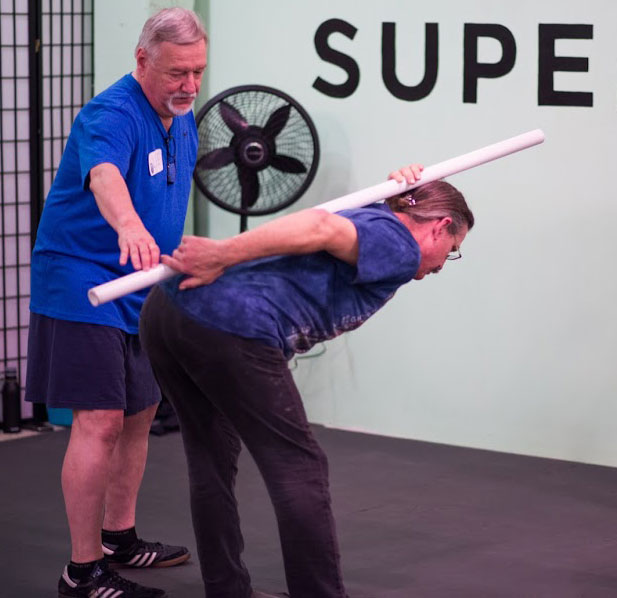
Dragon Door: Fantastic! And those two moves require a lot of skill, sometimes it’s necessary to go to an RKC, learn at the workshop, then process and practice it. Congratulations!
Lee Bacchi: And that's just it, you learn so much at the RKC. Even though I didn't get certified at the end of the weekend, I learned so much. It was just terrific meeting, interacting, and practicing with the other people who were there. It was really something to learn their stories. While I wish I had been able to get certified that weekend, it didn't really bother me that I needed to record two videos at home. I knew what I had to do, and that I would be able to do it relatively quickly.
Dragon Door: Before your interview, Dan John told me that you’re a Catholic priest. Are you also considering teaching others to use kettlebells?
Lee Bacchi: I haven't done it yet, but I hope that I can start training others. Now that I have the RKC certification, I feel more confident. But again, being able to open myself up to new ideas and new experiences—with the humility and patience to do it right, is an idea that can be translated into anybody's profession and life. And teaching others (especially "more mature" folks) about how to
stave off the effects of aging with kettlebells will be enormously satisfying. I don’t know if I am the only "person of the cloth" to earn an RKC, but I am certainly one of the oldest!
But I think it’s not so much about the kettlebell itself, but the approach you have to take with kettlebell training—humility, patience, and consistency. Those three things apply to anybody and in any area of life.
Now, people in the gym see me working out with kettlebells and ask me about it. Most big box gym trainers don't really know how to train people with kettlebells unless they have a kettlebell certification. When I talked to the guy using kettlebells in the gym three years ago, he made sure to tell me I really needed to learn from a master in order to use kettlebells correctly; otherwise you'll hurt yourself.
About a month before the RKC, I was training in the gym doing heavy one-arm swings and snatches. After I put the kettlebell down between a sets to rest, a woman walked up shaking her finger at me saying, "You know, mister, you're going to really screw up your back if you keep using those. I know that because I did!" Then she walked away. And I thought to myself, that she probably did not have good instruction or didn't follow it. It's just like when people tell trainers that they don’t do squats because squats hurt their knees. It’s usually not the squat, instead it’s how they’re doing the squats which is causing the injury and pain.
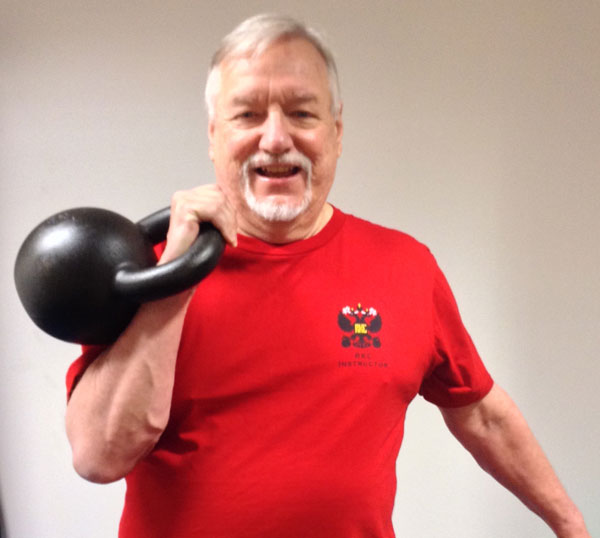
It’s really important to work with a
qualified instructor no matter what you're doing. It's certainly true with kettlebells. If I had tried to learn kettlebell training on my own, I probably would have hurt my lower back after 2-3 weeks. Then I would have decided not to do it anymore. Fortunately, I found a really terrific instructor, and we've been working together for three years. And now I'm still working with him on other goals. You need to have the right instructor from the start, which is why anyone who wants to get serious with kettlebells should look up an HKC or an RKC.
Right now, Pete is helping me increase my overall strength with deadlifting. Just this morning I spent 25 minutes unlearning how I was doing trap bar deadlifts. For me to learn to do them correctly, this has to happen! What I learned from a YouTube video, or from another personal trainer might not have been the right way, so relearning it has been part of the process.
I was doing barbell deadlifts earlier in my training but we had cut them out of my training before the RKC because I needed more recovery time. Now that I’ve passed, we've added them back to my training to help build more overall body strength. If I am going to be able to press the
48kg "beast" kettlebell, I need to be stronger! While that’s not one of my goals at this time, somewhere in my mind I say to myself, "Well, maybe you will."
Since I'm over 65, I only had to do 50 snatches in 3 minutes, but I am curious to find out how many snatches I can do in 5 minutes. I am still interested in improving my kettlebell performance, and want to be able to do every lift with a
24kg, even though my certification requirement weight was
20kg. The possibilities of what I will or will not be able to do are just so exciting.
While I don't think I'll try for the
RKC-II (but I do want to learn the windmill and the bent-press), I am definitely planning to recertify my RKC in three years—at age 69—that's for sure. I'm going to keep working with kettlebells, there's no doubt about that! Kettlebells have become my main method of exercise. Even though I get together once a month with a friend who likes to workout with barbells and dumbbells, as far as I'm concerned, kettlebells are it!
Dragon Door: How often do you train with kettlebells?
Lee Bacchi: On Wednesday mornings, I have my sessions with my instructor. I train with kettlebells three days a week, and on two other days I try to work on conditioning and endurance. The conditioning sessions may or may not involve kettlebells, but basically at least five days a week I'm doing some kind of training.
Dragon Door: That's great! Are you doing anything special for your recovery?
Lee Bracchi: It’s interesting, because when I was training for the RKC, my instructor Pete told me that I would need to be really careful about recovery. So, I made sure to have two days a week when I would just recover. It's still an issue for me, especially since I've now resumed deadlifting. Recovery is really important, so we are just taking it by ear right now to see how well I do. We’ll add more active rest on some days if I need it.
Recovery is very important, especially for us "more mature" folks. I don't like to use the term "older," but we definitely have to be more careful with recovery. We can't just train two hours a day, seven days a week, that's for sure! And this is part of the discipline—learning how much we can do without injuring ourselves or setting back our training programs. Without an adequate amount of recovery, there’s a higher risk of injury at the next session. The past three years I have learned the importance of recovery.
Learning to train with kettlebells has been like discovering a whole new area of knowledge, wisdom, insight and skills. Now, I don't care how much I bench press, instead, ask me how much I can get-up, how much I can snatch—and how many I can do in three minutes! This is my new barometer of athletic fitness, strength, and conditioning.
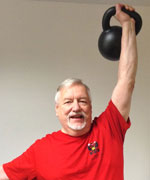 Lee Bacchi, RKC, 66, continues to train with kettlebells and other exercise tools at Girya Fitness under the direction of Pete Moore, RKC. Lee is a Roman Catholic priest of the Diocese of Joliet, Illinois, currently serving as a chaplain at Edward Hospital, Naperville, IL. Lee can be reached at leebphd@att.net, and has an FB page. He will soon be setting up an instructor's page on the Dragon Door website.
Lee Bacchi, RKC, 66, continues to train with kettlebells and other exercise tools at Girya Fitness under the direction of Pete Moore, RKC. Lee is a Roman Catholic priest of the Diocese of Joliet, Illinois, currently serving as a chaplain at Edward Hospital, Naperville, IL. Lee can be reached at leebphd@att.net, and has an FB page. He will soon be setting up an instructor's page on the Dragon Door website.
Back